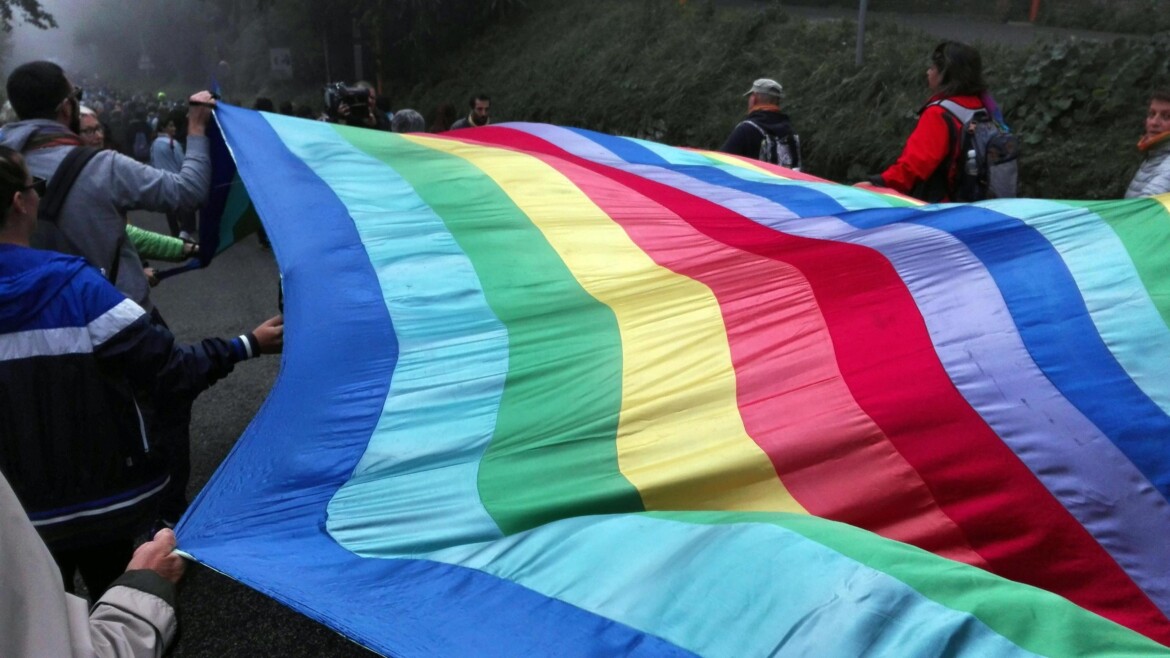Reportage
Perugia-Assisi Peace March aspires to transform a day into a global project
‘We are sitting on an enormous powder keg. We have reached a state of war consumerism.’

According to its founding charter, “all peace-loving states” can become members of the United Nations. But if those states continue to behave as belligerents, then it falls to “the peoples” who are “determined to save succeeding generations from the scourge of war” (as the Preamble states) to take center stage.
This is the spirit of the “UN Assembly of the Peoples,” held in recent days in Perugia. It was an event with many sessions, countless guests from 35 countries, and a strong focus on youth, the economy, and the opposition to rearmament. On Sunday, October 12, the historic Perugia-Assisi Peace March took place, a traveling demonstration that, as Flavio Lotti, president of the PerugiAssisi Foundation, explains, “renews the challenge to all who walk in it each year: to transform the commitment of a single day into a life choice to build peace” – something that we don’t have yet. Quite the contrary.
“We are sitting on an enormous powder keg. We have reached a state of war consumerism,” emphasized Nicolas Marzolino of the Italian Association of Civilian War Victims. In 2013, at age 15, he stumbled upon a World War II hand grenade, losing his sight and a hand. “Wars continue long after the agreements that end them,” he said, adding a call for action: “We have a duty to put our talents at the service of peace, while 31 countries are affected by armed conflicts.”
That doesn’t stop even when people think the conflicts are over. Saadia Kouti, from the Union of Municipalities of North-Western Syria, pointed a finger at Turkey, the new regime in Damascus, and the states that refuse to take back their citizens who were members of ISIS.
To break free from the paradigm of war, Issakha Koka Adouma, the mayor of Pikine Est in Senegal, put forward three proposals. First, states must shift their spending toward civilian needs. Second, “the African Union must transform itself into a global ambassador for peace.” And third, local territories must be primary actors for change.
In the face of burgeoning rearmament in Europe, Teresa Masciopinto, president of the Banca Etica Foundation, stressed: “To avoid the risk that we might be financing wars with our savings, we must be activists in our choices, engage in politics and demand transparency.” One of the assembly’s sessions was titled “Saving the UN, Our Common Home,” an institution that certainly needs profound reform but also more commitment on the part of its member states. And when will we see a Ministry of Peace in every country?
As the Community of San José de Apartadó in Colombia has shown – having survived 60 years of conflict thanks to its “choice to be neutral and not to use weapons,” not an easy one to make – “civilians can be the protagonists in overcoming war,” according to Alberto Capannini of Operazione Colomba, an organization with a decades-long presence in conflict zones. “Often, we don’t know what to do,” he said. “But at the very least, we can choose to live alongside the people who are in places of war.”
That is what many health workers who spoke in Perugia have done. Esmati Shekiba, an anesthetist with the NGO Emergency, spoke of her work in Afghanistan. Manahel Badr Saad Ali, a nurse from Emergency’s Salam Hospital in Sudan, described one of the world’s most urgent humanitarian tragedies. And De-Jospeh Kakisingi, a surgeon from Kivu in the Democratic Republic of the Congo, spoke about militias that continue to advance and people who have been without humanitarian aid for many months. Yara Abushabi is studying to join them: a medical student from Gaza, she had just arrived in Italy in October 2023 and has remained here. Her home university, her home, and many of her relatives are now gone. But, she said, “maybe you can hear a little bit of joy in my voice. Because we are convinced that the first true day of peace will be the last day of occupation.”
Do we have a real breakthrough in Palestine, which has become an emblem of all wars? Flavio Lotti thinks so. “The ceasefire is a very positive development. The Palestinians needed it, the world needed it. However, it is not yet a peace agreement: it is not based on the recognition of the dignity and rights of the Palestinians. And let us not forget what is happening in the West Bank.”
Originally published at https://ilmanifesto.it/perugia-assisi-una-giornata-che-diventa-scelta-di-vita-per-costruire-la-pace on 2025-10-12
